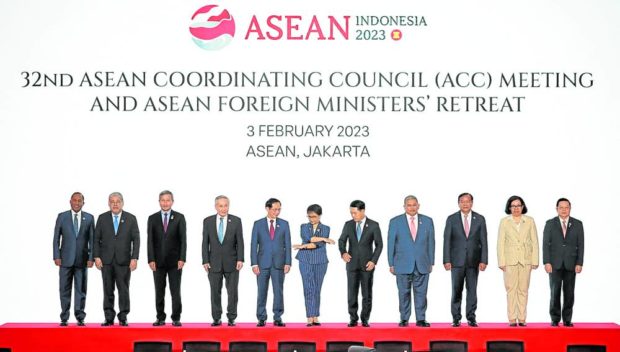Indonesia to intensify talks on South China Sea code of conduct

SEA DISPUTE ON AGENDA | Indonesian Foreign Minister Retno Marsudi (center) and her counterparts from other members of the Association of Southeast Asian Nations (Asean), prepare to pose for group photos during the 32nd Asean Coordinating Council meeting in Jakarta, Indonesia, on Feb. 3, 2023. (REUTERS)
JAKARTA, Indonesia — Indonesia said it plans to intensify talks with other Southeast Asian countries and also with China to finalize a code of conduct (COC) on the South China Sea, as it also urged the major powers not to use Southeast Asia as a “proxy” for their rivalries over the strategic, resource-rich waterway.
Foreign ministers representing the 10 member states of the Association of Southeast Asian Nations (Asean) gathered here on Friday for a two-day meeting to discuss “the commitment of members to conclude the negotiation of the COC as soon as possible,” said Indonesia’s Foreign Minister Retno Marsudi.
Sidharto Suryodipuro, director of Asean cooperation at Indonesia’s Foreign Ministry, said at the sidelines: “What’s important is that all agree that this should be an outlook that is implementable and in accordance with international law.”
“New approaches” would be explored by all Asean member states and China to make progress on the COC, he said.
Austin’s visit
At the start of that meeting, Indonesian President Joko Widodo himself addressed the foreign ministers, as he reiterated his call in last year’s Asean summit that the regional bloc “should not be a proxy for any party.”
Article continues after this advertisementFollowing the visit of US Defense Secretary Lloyd Austin III on Friday, the Philippines granted the United States greater access to its military bases, in part due to Beijing’s extensive claims over the South China Sea.
Article continues after this advertisementThis prompted Beijing’s objection, as its Manila embassy warned the Philippines to “stay vigilant and resist from being taken advantage of and dragged into troubled waters.”
China claims jurisdiction over almost the entire South China Sea, based on its “nine-dash-line” boundary. But an international arbitral tribunal found that claim to have no legal and historical basis in its 2016 ruling on Manila’s case challenging Beijing’s assertions.
The South China Sea disputes have pitted some Asean members against Beijing and boosted sympathy for US opposition to China’s growing assertiveness.
But others have shown support on issues in line with the Asian superpower.
Ties over consensus
Indonesia is not an official claimant but has faced pushback from China over its exploration of oil and gas reserves in the North Natuna Sea.
Last month the country sent a warship to the area to monitor a lingering Chinese coast guard vessel.
Amid these tensions, negotiations on the COC—a proposed framework to help tackle territorial and maritime disputes in the waterway—have stalled for years, as some Asean states prioritized bilateral ties with China over a regional consensus.
As Asean chair this year, Indonesia—Southeast Asia’s biggest economy — will host the annual leaders’ meetings, which are typically also joined by China and the United States.
Another issue dominating the foreign ministers’ agenda was the crisis in military-ruled Myanmar, which has been in turmoil since the army seized power in 2021.
The junta remains an Asean member but has been barred from top-level summits over a lack of progress on the regional bloc’s plan for a peace settlement between the military and Myanmar’s anticoup movement.